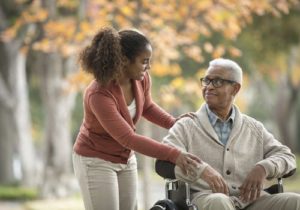
The holidays have now come and gone, and most of us spent time with loved ones. For some, the Thanksgiving/Christmas season of 2021 may have been the first time seeing a relative since COVID began. With not having seen a loved one, it may be startling to see how much a loved one has changed since your last visit. It is vital to take note of the physical, cognitive, and behavioral changes to ensure your loved one is getting the proper care he/she needs.
Becoming a caregiver for a family member or loved one is a very rewarding task, but it can also be scary. Bringing in the right help, at the right time, can both take a huge stressor off you but ensure your loved one is receiving the optimal care he/she needs. This care can range from sitters, Meals on Wheels, transportation services, palliative or hospice care, home health, adult day centers, assisted living facilities, or nursing homes.
Signs Your Loved One Needs More Help
Sometimes if you don’t see a loved one regularly, it can be hard to see changes. Going to visit with him/her in the home and seeing if there are medications that haven’t been taken in a while, if your loved one has began to withdraw from activities that were once enjoyed, or if he/she has stopped caring for themselves or their home. You can’t see these changes over the phone so use this in-person visit to assess any physical, behavioral, or cognitive changes in your loved one.
Physical Changes
There are quite a few physical changes you will notice when a loved one begins to decline. The most prominent is a significant weight loss. This weight loss occurs without even trying, and may be an indicator that there could be a bigger problem. Your loved one may have difficulty eating, drinking, or moving around. More indicators can include stiffness or bruising/skin tears from a fall or other injury that your loved one doesn’t want to disclose. Poor hygiene is another indicator; including dirty clothes or not grooming themselves
Behavioral Changes
Whether obvious or subtle, behavioral signs are another indicator that something can be wrong. Maybe your loved one has always been a very good housekeeper, but now you notice their home is dirty or cluttered. Maybe he/she has a pantry and fridge full of expired groceries. Maybe he/she hasn’t opened their mail in a while or has no interest in activities once enjoyed. It’s also important to take note of mood swings, increased agitation, or changes in sleeping patterns.
Cognitive Changes
While anyone can have a forgetful moment, more occurrences of uncertainty, confusion, or a loss of reasoning skills are cause for concern. These might take form in missed or late payments, forgotten appointments, or forgetting to take medication. A lost ability to concentrate, trouble remembering recent events, or personality changes can be a sign of Alzheimer’s Disease or a form of dementia.
How to Get Help for a Senior
Every situation is unique! The appropriate care for your loved one may differ from someone else’s care since it depends on their changes and needs. If your loved one needs a higher level of care, hospice may be appropriate for him/her. If he/she needs care but isn’t quite ready to give up curative treatment options, palliative care may be better.
If you or a loved one is in need of hospice or palliative care, please call St. Anthony’s Hospice and Palliative Care at (270) 826-2326 or make an online referral.
